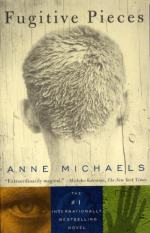
|
| Name: _________________________ | Period: ___________________ |
This test consists of 5 short answer questions, 10 short essay questions, and 1 (of 3) essay topics.
Short Answer Questions
1. What does Ben picture about Jakob's journals?
2. What stories does Ben tell Petra?
3. In what color can a Polish painter Jakob meets not paint?
4. When does Jakob finish writing his life's stories?
5. What does Ben say the quest to recover someone's psyche is?
Short Essay Questions
1. Describe Ben's futile search for Jakob's journals.
2. What does Jakob think about concerning a child?
3. What theme does Ben incorporate into his thesis?
4. What impact does being in Idhra have on Jakob?
5. How does Ben's relationship with Petra evolve?
6. What does Ben find in Jakob's study?
7. How does Ben find Jakob's study?
8. Who visits Ben before he is five and what is the result?
9. What does Jakob think about as far as the Nazis' effort to dehumanize the Jews?
10. What is the parable of the rabbi traveling incognito and what is the moral of the parable?
Essay Topics
Write an essay for ONE of the following topics:
Essay Topic 1
1. What is foreshadowing? How many incidences of foreshadowing are in "Fugitive Pieces"? How does foreshadowing contribute to a book's suspense?
2. Discuss an example of foreshadow in "Fugitive Pieces" including why you believe it is foreshadow. Include examples from the book and your own life to illustrate your answer.
3. How do you think most people react to uncertainty in their lives? Use examples from "Fugitive Pieces" and your own live to support your opinion.
Essay Topic 2
Athos tells about ancient Biskupin culture and his work to preserve the ruins. After the war, he learns that the Nazis had destroyed the excavations and killed Athos's colleagues shortly after he spirited Jakob to safety. It is the basis for Athos's belief that Jakob is responsible for saving him, more so than vice versa. Jakob meditates on how prisoners are forced to dig up the mass graves of early victims of Nazism as the perpetrators seek to cover up evidence. He pictures workers forced, like the stone carriers of Golleschau, to do the unthinkable: handle the gory remains of the dead.
1. Why do you think it is significant that the Nazis destroyed archeological ruins or historical sites? Discuss in depth the implications and what you believe may or may not have been lost in such destruction. Use examples from your own life and "Fugitive Pieces" to support your answer.
2. Discuss what you think might be the reasons Athos believes Jakob saved his life. Do you agree? Why or why not? Use examples from your own life and "Fugitive Pieces" to support your answer.
3. Discuss the mental and emotional tolls that must have been taken on the workers forced to do the handling of so many murdered Jews. Use examples from your own life and "Fugitive Pieces" to support your answer.
Essay Topic 3
Sometimes a book has more of a character-driven plot rather than action driven, and sometimes it is the other way around. Some books seem to balance the two. Discuss the following:
1. What do you think it means to say that a plot is character driven? Action driven?
2. How do you think a plot differs if it is character driven versus action driven?
3. Which type of plot do you find more interesting? Why?
4. Do you think it is possible to have a plot where action and character development share equal time? Why or why not.
5. What type of plot do you think "Fugitive Pieces" is? Explain your response.
|
This section contains 1,027 words (approx. 4 pages at 300 words per page) |

|




